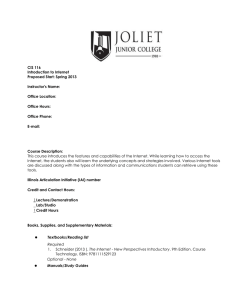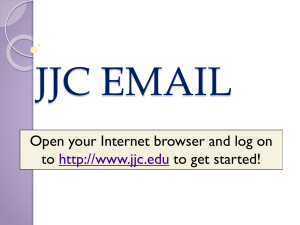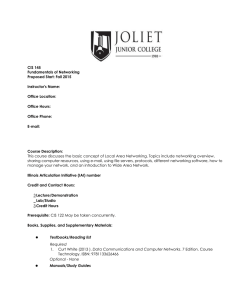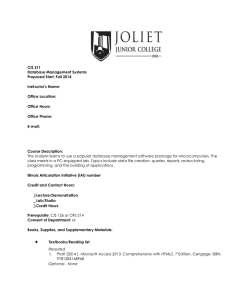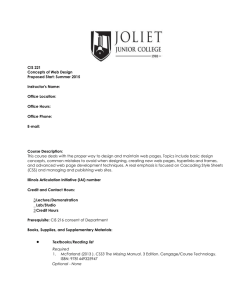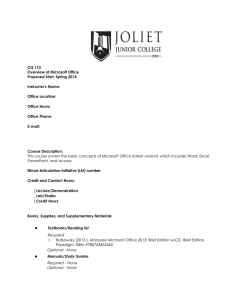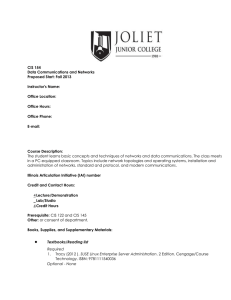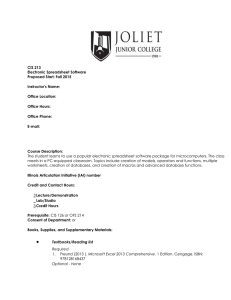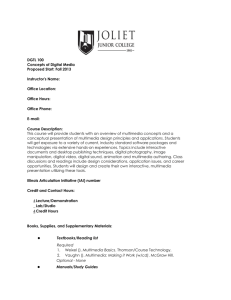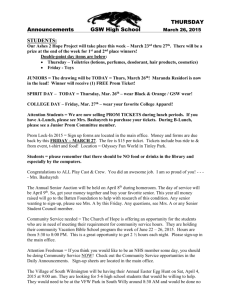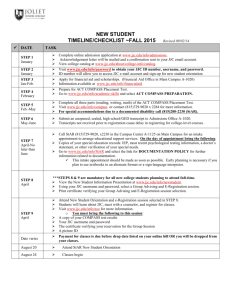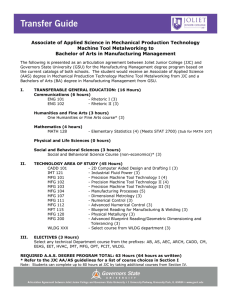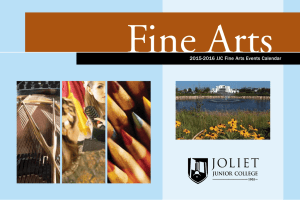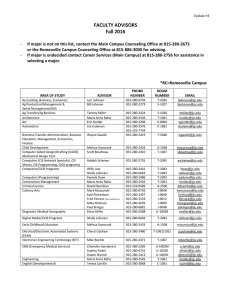CIS 101 Computer Basics Proposed Start: Fall 2014 Instructor's Name:
advertisement
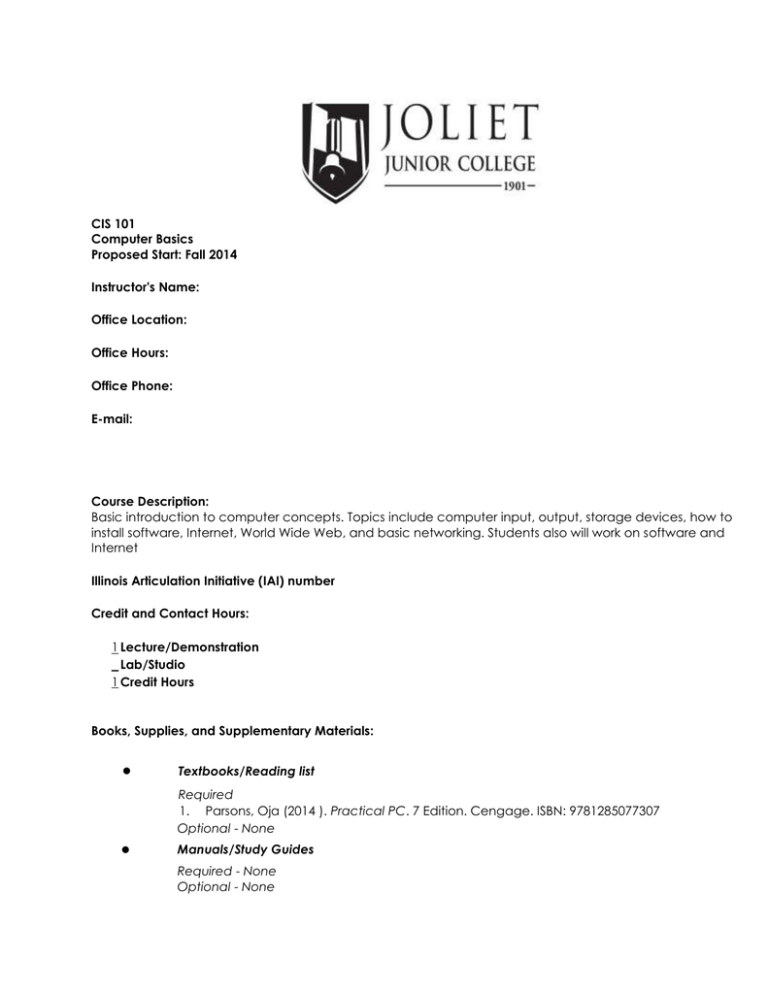
CIS 101 Computer Basics Proposed Start: Fall 2014 Instructor's Name: Office Location: Office Hours: Office Phone: E-mail: Course Description: Basic introduction to computer concepts. Topics include computer input, output, storage devices, how to install software, Internet, World Wide Web, and basic networking. Students also will work on software and Internet Illinois Articulation Initiative (IAI) number Credit and Contact Hours: 1 Lecture/Demonstration Lab/Studio 1 Credit Hours Books, Supplies, and Supplementary Materials: • Textbooks/Reading list Required 1. Parsons, Oja (2014 ). Practical PC. 7 Edition. Cengage. ISBN: 9781285077307 Optional - None • Manuals/Study Guides Required - None Optional - None • Periodicals Required - None Optional - None • Software Required - None Optional - None • Supplementary materials 1. flash drive Methods of Instruction: Student Learning Outcomes: Course Content Outcomes 1. Differentiate between computer hardware and software. 2. Explain the functions of and operating system. 3. Discuss the concept of networking. 4. Use internet with a browser. 5. Explain the basics of windows operating systems. 6. Apply basic word processing, and file management skills. 7. Use and explain the concept of various e-mail systems. General Education Student learning outcomes: Students will demonstrate competence in using academic technology including finding, evaluating and utilizing appropriate information sources. Students will demonstrate an ability to think critically and analytically. Graded assignments and policies: Graded Assignments Projects and Homework Grading policy A = 90 - 100%, B = 80 - 89%, C = 70 - 79%, D = 60 - 69%, F = Major Tests and Quizzes Chapter quizzes, Midterm, and a comprehensive final exam will be given. Classroom Policies and Procedures A. General Information B. Attendance Policy C. Make-up Policy D. Extra-credit Policy E. Final Exam Information F. Academic Honor Code The objective of the academic honor code is to sustain a learning-centered environment in which all students are expected to demonstrate integrity, honor, and responsibility, and recognize the importance of being accountable for one's academic behavior. G. College Statement about grades of 'F' and withdrawal from class o Students may withdraw from a course by processing an add/drop form during regular office hours through the Registration and Records Office at Main Campus or Romeoville Campus, or by phone at 815-744-2200. Please note the withdrawal dates listed on your bill or student schedule. Every course has its own withdrawal date. Failure to withdraw properly may result in a failing grade of 'F' in the course. o At any time prior to the deadline dates established, an instructor may withdraw a student from class because of poor attendance, poor academic performance or inappropriate academic behavior, such as, but not limited to, cheating or plagiarism. H. Intellectual Property Students own and hold the copyright to the original work they produce in class. It is a widely accepted practice to use student work as part of the college's internal self-evaluation, assessment procedures, or other efforts to improve teaching and learning and in promoting programs and recruiting new students. If you do not wish your work to be used in this manner, please inform the instructor. I. Student Code of Conduct Each student is responsible for reading and adhering to the Student Code of Conduct as stated in the college catalog. J. Sexual Harassment Joliet Junior College seeks to foster a community environment in which all members respect and trust each other. In a community in which persons respect and trust each other, there is no place for sexual harassment. JJC has a strong policy prohibiting the sexual harassment of one member of the college community by another. See Catalog or Student Handbook. K. Student Support http://jjc.edu/services-for-students/pages/default.aspx a. Disability Services: http://jjc.edu/services-for-students/disability-services/Pages/default.aspx. Student Accommodations and Resources (StAR): If you need disability-related accommodations, specialized tutoring, or assistive technology in this class, if you have emergency medical information you wish to share with me, or if you need special arrangements in case the building must be evacuated, please inform me immediately. Please see me privately after class or at my office. New students should request accommodations and support by scheduling an appointment with the Student Accommodations and Resources (StAR) Office, Campus Center 1125, (815) 280-2230. b. Tutoring: http://jjc.edu/services-for-students c. Counseling and Advising: http://jjc.edu/services-for-students/counseling-advising d. Academic Resources: http://jjc.edu/services-for-students/academic-resources e. Support Programs: http://jjc.edu/services-for-students/support-programs-services f. Technology Support: http://jjc.edu/services-for-students/Pages/technology-support.aspx L. Safety M. College Documentation Styles Course Outline Unit, Topic, Class Activity Week 1 (Indicate approximate time allotment for each topic/unit) What is a Computer? History of the Computer How Computers are Used Types of Computers What Is a Computer System? Data Communications Computers in Our Future How Does a Computer Process Data Computer System Components System Components 2 Data Representation How Do I Input Data and Output and Store Information? Input Devices Output Devices Connecting Input/Output Devices to the Computer Storage Devices Caring for Removable Storage Media What is Software? Comments Hardware vs. Software Types of Software Microcomputer Operating Systems Interfaces 3 Microcomputer Operating Systems How Do I Keyboard? – Hands On First Things First Developing Beginning Keyboard Skills Additional Concepts Using Your New Keyboard Skill What Basic Skills Do I Need to Use The Computer? – Hands On Overview of Graphical User Interface (Windows) Starting and shutting Down the GUI (Windows) Opening a Window Closing a Window Formatting a Disk Files and Folders Starting a Program Managing Files Getting Help 4 How Do I Use Word Processing Software? – Using Microsoft Word What is Word Processing Software? The Word Processing Screen Other Features of Word Processing Software Preparing a Letter What is the Internet? – Using Microsoft Internet Explorer Evolution of the Internet Accessing the Internet-Dial in or Direct Connection 5 How does the Internet Work? Major Features of the Internet E-mail Chat Rooms Web Development Mailing Lists News Groups File Transfer Protocol Final project / Exam Effective Date: 01-August -2014 Signature of Department Chair:__________________________________ CID: 3271
